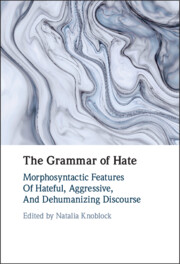Book contents
- The Grammar of Hate
- The Grammar of Hate
- Copyright page
- Contents
- Figures
- Tables
- Contributors
- Acknowledgments
- Introduction
- 1 Animacy and Countability of Slurs
- 2 Language Aggression in English Slang: The Case of the -o Suffix
- 3 Adj+ie/y Nominalizations in Contemporary English
- 4 Grammatical Gender and Offensiveness in Modern Greek Slang Vocabulary
- 5 Unseen Gender
- 6 The Neutering Neuter
- 7 Neutering Unpopular Politicians
- 8 The Power of a Pronoun
- 9 Is Play on Words Fair Play or Dirty Play?
- 10 Expressive German Adjective and Noun Compounds in Aggressive Discourse
- 11 ‘Kill the Invaders’
- 12 ‘I am no racist but …’
- 13 Homophobic Space–Times
- Index
- References
11 - ‘Kill the Invaders’
Imperative Verbs and their Grammatical Patients in Tarrant’s The Great Replacement
Published online by Cambridge University Press: 30 June 2022
- The Grammar of Hate
- The Grammar of Hate
- Copyright page
- Contents
- Figures
- Tables
- Contributors
- Acknowledgments
- Introduction
- 1 Animacy and Countability of Slurs
- 2 Language Aggression in English Slang: The Case of the -o Suffix
- 3 Adj+ie/y Nominalizations in Contemporary English
- 4 Grammatical Gender and Offensiveness in Modern Greek Slang Vocabulary
- 5 Unseen Gender
- 6 The Neutering Neuter
- 7 Neutering Unpopular Politicians
- 8 The Power of a Pronoun
- 9 Is Play on Words Fair Play or Dirty Play?
- 10 Expressive German Adjective and Noun Compounds in Aggressive Discourse
- 11 ‘Kill the Invaders’
- 12 ‘I am no racist but …’
- 13 Homophobic Space–Times
- Index
- References
Summary
Access to hate speech has been greatly facilitated by the rise and spread of social media. This chapter examines one clear case of this in the 74–page manifesto entitled, The Great Replacement, posted on Facebook by Brent Tarrant, the Christchurch mosque shooter. This chapter explores how violence-related imperative verbs are used to incite harmful acts against perceived enemies throughout the manifesto. Theoretically, the chapter is grounded in the quantitative cum qualitative tradition of corpus stylistics, whereby lexical frequency patterns are calculated by corpus software and then hand-checked. Methodologically, the study relied on UCREL’s CLAWS7 and WordSmith 6 corpus software to identify and examine violence-related lexis. Three imperative verbs were identified: KILL, DESTROY, and RAGE. Concordances of these verbs were generated and compared to their counterparts in the BNC. The results indicated that, in contrast to the BNC where these verbs were generally used in metaphorical and non-violent ways, the author of the manifesto deployed these verbs in concrete ways in order to incite actual acts of violence against immigrants, economic, and specific political elites. The chapter highlights how these imperatives are used by the author to attempt to position himself as a de facto leader of an envisioned violent, anti-establishment white supremacist movement.
- Type
- Chapter
- Information
- The Grammar of HateMorphosyntactic Features of Hateful, Aggressive, and Dehumanizing Discourse, pp. 222 - 240Publisher: Cambridge University PressPrint publication year: 2022
References
- 1
- Cited by

